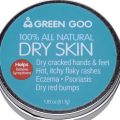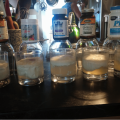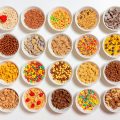
Written by Suzanne, Chief Health Officer and Resident Grandmother
Okay, this a trick question, but it’s one we are asked a lot. The rice cereal that is best for your baby’s first food is…none.
Our readers often ask why we haven’t done a Safe Product Guide on rice cereal for babies. Most pediatricians still recommend rice cereal as the first food, because it’s gluten-free and almost never causes an allergic reaction. And readers think, surely there are brands that are Good, and also Sneaky ones that could be uncovered and then avoided?
It’s true that if you are going to start your baby on rice cereal, some brands are better than others (I would opt for this one if pressed), but more importantly, any boxed, ready-made rice cereal is highly processed and really unnecessary as a first food. Here’s why:
- Most rice cereals are made from white rice. Dr. Alan Greene, who was a guest with Maia on The Dr. Oz Show last year, says that white rice cereal is nearly the same as pure sugar, metabolically speaking.
- Many manufacturers add thickening agents like flour and starches to their rice cereals.
- Many health practitioners recommend not giving babies any grains until they are at least a year old, as grains can be hard to digest.
- There are concerns about arsenic in rice and rice cereals.
What about brown rice cereals or homemade rice cereals?
If you really want to feed your baby a boxed rice cereal, you should definitely opt for one made from brown rice. These certainly are a better bet, especially if they are made with organic brown rice. However, for the reason stated above, I always recommend skipping the boxed stuff and making your own brown rice for your baby to keep nutrients intact. There are a couple of different ways to make a rice cereal.
- You can grind your rice before cooking it, making it cook faster and yielding a great texture for a baby. A recipe for this method can be found here.
- Soak your rice instead of grinding. This is my preference because soaking rice (and other grains) limits phytic acids and increases digestibility (click that link to learn about phytic acids and why you’d want to remove them). Of course, if you soak the rice first, you will not be able to grind it, but that’s okay! Below is my recipe for homemade brown rice cereal for a baby. You can also try other whole grains for a homemade cereal—quinoa or millet both work well.
Homemade Brown Rice Baby Cereal
1. Measure ½ cup of organic brown rice (or quinoa or millet) and rinse under cold water using a fine mesh strainer.
2. Soak grains for one to eight hours to soften, increase digestibility, and eliminate phytic acid. Drain grains and discard the soaking water.
3. Place rice with 1 ½ to 2 cups of water in a pot and bring to a boil.
4. Reduce heat and cover and simmer until the water is absorbed, about 45 minutes (or the suggested amount of time, depending on the grain you chose), without stirring during the cooking process.
5. When it is finished you can mash it further by putting it through a baby food mill or even with a fork. You can then dilute with water, breastmilk, or formula before feeding to your baby.
Oatmeal can also be made by soaking and adding extra water when cooking to make it creamier and even easier to eat and digest for a young baby.
What about foods other than grains?
Some of our readers don’t eat grains at all, and naturally plan to keep their babies on grain-free diets. There are plenty of alternatives for first foods, and Dr. Greene argues that we should NOT be starting kids on grains at all, considering our obesity epidemic.
 In any case, for a six-month old baby, I would start with fresh fruits and vegetables and then as they get older, move to homemade whole grains. Here are some good options:
In any case, for a six-month old baby, I would start with fresh fruits and vegetables and then as they get older, move to homemade whole grains. Here are some good options:
- Pureed fresh fruits (dried fruit that’s been soaked, stewed, and mashed is also quite sweet and tasty).
- Fresh vegetables of all kinds (steamed and then mashed).
- Sweet potatoes (boiled or steamed and mashed).
- Winter squashes (butternut, buttercup, delicata).
Some moms like to feed babies simple foods like avocado and bananas, both of which require only mashing. While this is fine, keep in mind that these are tropical foods and not local for us in the Northern latitudes. I believe they are fine to eat occasionally, but I do like to eat organically, seasonally and locally as much as possible. So for this time of year, apples, pears, and maybe some frozen berries or dried fruits would be my choice.
As your baby grows and gets used to eating, you may put a small portion of your own food into a separate dish for the baby, mashed as needed.
Below are some great baby food books that I’ve consulted since becoming a grandmother!
- Feeding the Whole Family: Recipes for Babies, Young Children, and Their Parents, by Cynthia Lair
- Super Nutrition for Babies: The Right Way to Feed Your Baby for Optimal Health, by Katherine Erlich
- 201 Organic Baby Purees: The Freshest, Most Wholesome Food Your Baby Can Eat! by Tamika Gardener
- The Amazing Make-Ahead Baby Food Book: Make 3 Months of Homemade Purees in 3 Hours, by Lisa Barrianngon PhD
If you liked this post, sign up for our newsletter to be alerted when we publish new content like this!








Kimberly says
What about an oatmeal cereal or quinoa cereal?
Suzanne (Maia' s mom) says
Hi Kimberly,
Yes, oatmeal and quinoa cereal, while still being grains are good alternatives to rice. If you are looking at already prepared oatmeal and quinoa cereals they are more convenient and again a step down in nutritional value. You can make quinoa and oatmeal from whole grains by cooking them with extra water. Technically, whole oats are the whole grain version of oats but they are not as available and require a long long cooking time. Steel cut oats are slightly less processed than rolled oats but also require more cooking time and more water. I like to cook steel cut oats in a crock pot 1 cup to 6 cups of water overnight and it makes a smooth creamy cereal in the morning, good for baby and the whole family. Rolled oats are quickly prepared by soaking overnight and then cooking in the morning. You can also just make rolled oats without soaking. Just add extra water for a baby. Certainly, if it is easier to begin with the boxed varieties until you are more comfortable cooking whole grains then that is a good choice. Just be sure to read the labels and look for organic grains.
Jordan says
Hi, How can we prepare the oats or quinoa to be mixed with breastmilk? Thanks in advance !
Janelle says
If I were to double or even triple your grain recipe, could I refrigerate the leftovers and serve over the next few days or would it be best to make a new batch for each feeding? If it is okay to reuse how would you recommend heating it up? Thank you in advance!
Suzanne Weaver-Goss says
Sorry, I don’t see my response and I thought I had responded to this before. Of course, you can make extra and reheat. I call this cooking once and eating 2 or 3 times. It saves time in our busy lives to do this. I would heat it up by steaming it with a steamer basket or use a small amount of water to saute. Suzanne
Michelle says
My pediatrician keeps recommending I start my son on cereal due to iron deficiencies in breast milk and/or formula. Is this really true? We are currently finishing up the freezer stash of breast milk (exclusively pumped for 6 months) and then will move him to Baby’s Only Organic Formula with DHA. We have introduced some solids, but he plays more than actually eats, so I wouldn’t be comfortable relying on that for a substantial nutrition source.
Suzanne Weaver-Goss says
Yes, by six months of age, especially breast fed babies can develop iron deficiencies. Rice cereals are not the only way to provide that. You can search iron rich foods and ask your pediatrician about providing iron from other foods. I used to cook dried prunes in water until they made a sweet puree and put them on oatmeal or just have them for a treat for the kids when they were young. Maia’s pediatrician agrees that toddlers from breast fed moms are slightly anemic and says it’s not a concern, so pediatricians differ in opinions too. I believe formulas contain iron so check the formula you are using. There is more of a concern with babies that are strictly breastfed. I have provided some interesting reading on the subject below.
http://www.whattoexpect.com/toddler-nutrition/iron-and-toddlers.aspx
http://scienceofmom.com/2011/10/12/why-is-breast-milk-so-low-in-iron/
Caitlin Atkins says
I chose not to use the pouches of food because we do not store our food in plastic, or eat/ drink out of plastic containers. I hadn’t considered different heat/ nutritional content. What is your take on the risk/ benefit of the pouches, considering they are plastic?
Maia James says
Hi Caitlin-
We wrote about pouches here: https://gimmethegoodstuff.org/safe-product-guides/pouches-of-food
The type of plastic used in the pouches (polypropylene) is the least concerning type of plastic (shown to be non-leaching), but I am with you that all plastic should be avoided to the degree possible.
Robin says
What do you think about Kiinde breast milk storage bags? Would you consider them a “better” storage bag? Their website says the pouch is made of low-density polyethylene (#4) and is BPA-free, pthalate-free, and PVC-free.
Maia James says
Yes, low density polyethylene appears to be a safer, non-leaching plastic option.
Linda says
Hi,
After reading your article 2 months ago I purchased a Beaba food maker and it’s been an adventure slowly introducing new foods to my LO! However, my husband still feels we should have a box of cereal on hand just in case……if pressed I know the article opted for the Bio Kinetics brand but since my LO has been on everything Holle I was wondering if the Holle cereals were worth a shot? In addition if I make a batch of steel cut oats will it last a month if I freeze it?
Suzanne Weaver-Goss says
Hi Linda,
Good for you making your own baby food. It is so worth it. I did it for my two (Maia and Graham) and they both grew up eating whole natural foods and now they feed their own children whole foods. It starts a trend that has huge health benefits for generations to come.
I know Maia recommends the Holle formula but the cereal has palm oil and maltodextrin. Maltodextrin is a highly processed sweetener made from corn and I think it’s an unnecessary addition to a whole grain cereal. Grains are naturally sweet and can be enjoyed without being sweet especially for a baby. I know they are convenient but convenience has a health price unfortunately. Oatmeal is pretty quick to make, it you use rolled oats and babies love it. If you want to add sweetness use fruit. You can cook apples or any fruit, even dried fruit. And yes you can freeze a batch of steel cut oats and they will be good for a month.
Linda says
Great! I’ll freeze a batch & if I catch myself in a bind Oatmeal & fruits it is (though I’m hoping there won’t be a need for it). Thanks for answering my question.
Milena says
Hi, thank you for this article. I tried to do a little more research about Bio-Kinetics as a company, but it doesn’t look like they have a big online presence right now and only a few customer reviews to rely on. I still went ahead and ordered the baby cereal from their website, because I really trust the information on your blog, but I am now wondering what you base your recommendation on.
Deanna says
I am wondering the same! I was about to ask that question.
Deanna says
http://bio-kinetics.myshopify.com/collections/baby-cereal
Kelly says
I was wondering what your thoughts are on Happy Baby Organic Probiotic Baby Cereal?
Suzanne Weaver-Goss says
Hi Kelly, I think it’s fine. I am just a little skeptical of any food that is processed and has so many ingredients. I am personally more comfortable with homemade oats or brown rice with added yogurt are fruit.
Maia James says
There is nothing wrong with this cereal, but we recommend skipping all boxed brands for optimal nutrition: https://gimmethegoodstuff.org/rice-cereal/
Suzanne Weaver-Goss says
I believe that there is always a compromise for convenience. Although, we all have to decide for ourselves where we want to compromise.
Kay says
Hi, my baby is almost 5 weeks old and the pediatrician is recommending I mix rice cereal with breast milk because he’s showing symptoms of reflux…arching back, crying/screaming after feeding, spitting up. I’m hesitant because I’ve read introducing any solids so early is like weaning plus giving grains this young can cause allergies later. I’m conflicted because I do think he could have some pain and I definitely don’t want him damaging his esophagus, but I was hoping to stick to breast milk for at least 6 months to a year. Keeping him inclined just isn’t solving the issue. What are your thoughts? Thank you! – Kay
Suzanne says
Hi Kay,
I am not a doctor so I cannot say what is best for your baby, however, I agree with you that introducing solids at this young age isn’t something that I have heard of. I suggest you might seek a second opinion from another pediatrician. Also, we do have a post that you might be interested in reading about probiotics which can be helpful for digestive issues. https://gimmethegoodstuff.org/?s=probiotics
Vanessa says
Hi there,
Any thoughts on the NurturMe brand of cereal? My daughter is 9 months and has been on solids since 6 months. The only grain she’s had has been oatmeal. I keep meaning to venture out to quinoa, but then I saw this and thought it may be more convenient.
http://nurturme.com/collections/cereals
Thanks!
Suzanne Weaver-Goss says
Hi Vanessa,
I am not familiar with it but it looks fine to me and it might be more convenient if traveling. For me, I like just having the fresh plain grain around and adding my own condiments (fruit, seeds, or dairy if wanted) but if this works better for you then sure it looks good.
Regards,
Suzanne
Maia James says
There is nothing terrible about these–but they are very processed, so whole quinoa would still be better, in my opinion.
holly says
Actually, not all avocados are from far flung locations.
We have an avocado tree in our back yard (we live in Los Angeles)…
Thanks for all the good work. Just wanted to
Maia James says
Ha! Great point! I sometimes forget that we don’t all live in the miserable North East!
Nereida says
Hi there
Great blog. My mom insists my son should eat boxed cereal and I refuse. I feed him home made oatmeal with ground flax seeds and I put in a graded apple to sweeten it.
My question is white rice bad for us? Not the cereal. I mean the rice itself? What alternatives are better?